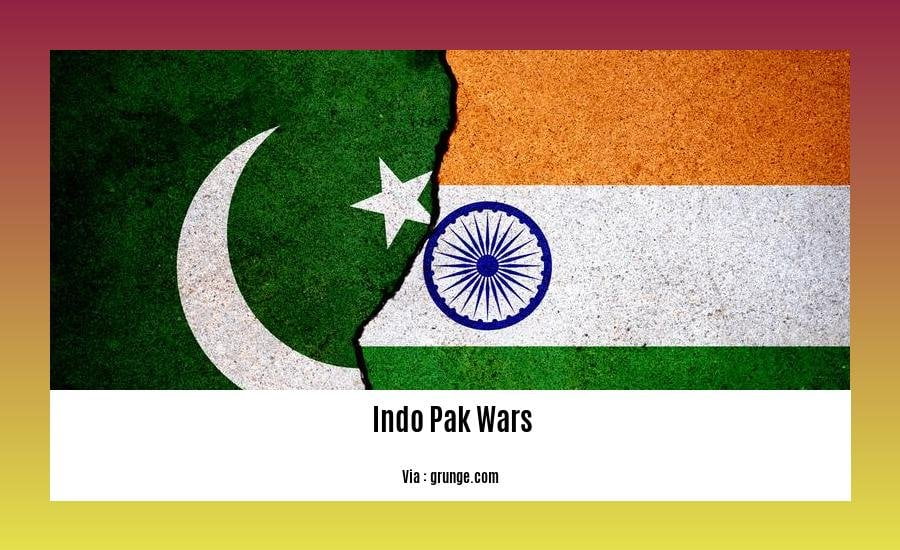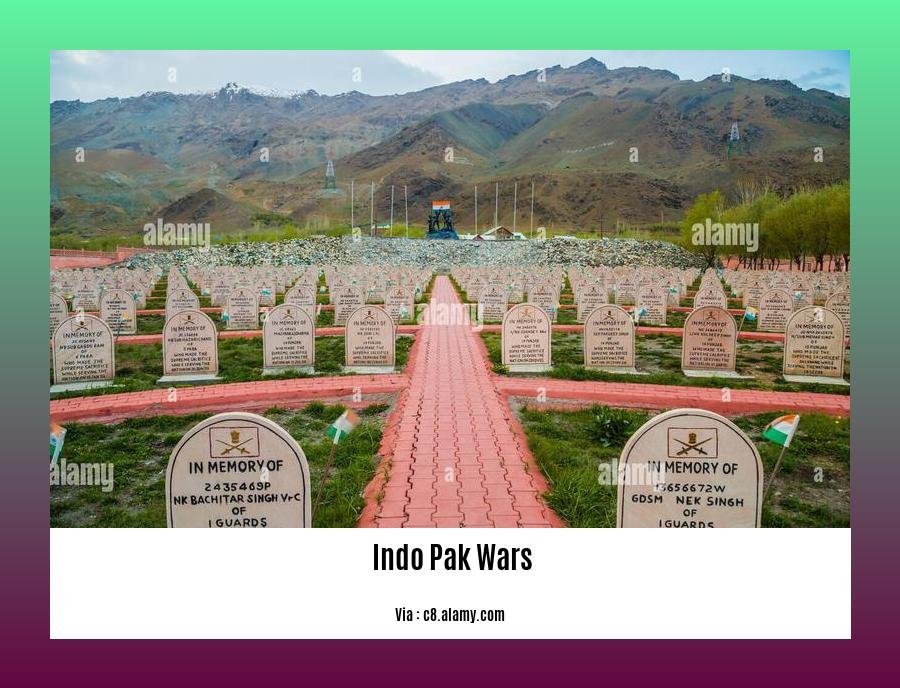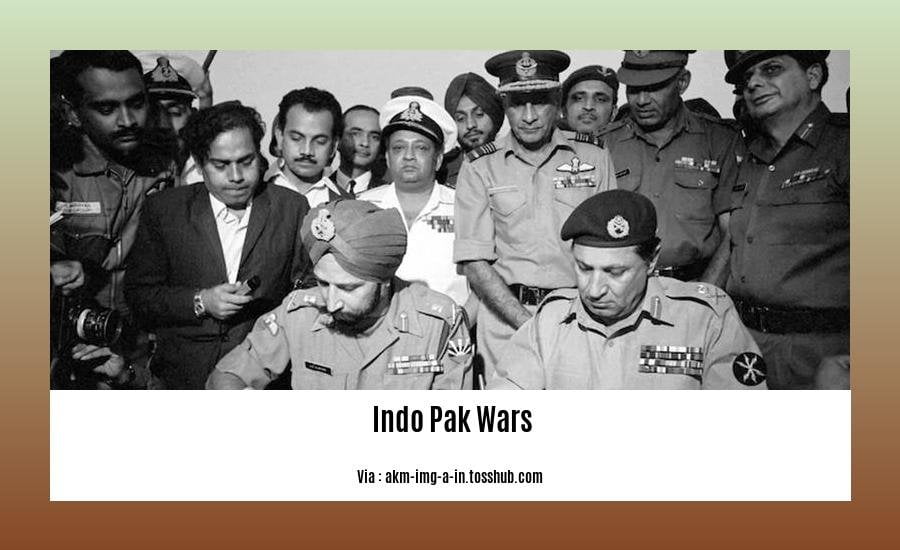The catastrophic conflicts between India and Pakistan, known as the Indo-Pak wars, have left an enduring mark on the history of South Asia. These wars have exacted a heavy toll on both nations, resulting in countless lives lost, widespread devastation, and profound social, economic, and political consequences. Understanding the devastating impacts of these wars is crucial for gaining insights into the complexities of Indo-Pak relations and their implications for regional stability and global security.
Key Takeaways:
- Indo-Pakistani wars: military conflicts over Kashmir and other issues.
- Main wars include the First and Second Kashmir Wars (1947-1948, 1965) and the Bangladesh Liberation War (1971).
- 1965 war: border disputes and Pakistani infiltration.
- 1971 war: Bangladesh Liberation War.
Indo-Pak Wars: A Historical Perspective

Let’s delve into the intricate history of the Indo-Pak wars, military conflicts that have shaped the course of South Asia for decades.
The Seeds of Conflict
The roots of these wars lie in the partition of British India in 1947, which divided the subcontinent into India and Pakistan. The disputed territory of Kashmir has been a flashpoint between the two nations ever since.
Major Conflicts
The Indo-Pak wars have taken various forms throughout history, with three key conflicts standing out:
- First Kashmir War (1947-1948): India and Pakistan clashed over the control of Kashmir, leading to a stalemate.
- Second Kashmir War (1965): Border disputes and Pakistani infiltration sparked this conflict.
- Bangladesh Liberation War (1971): This war resulted in the creation of Bangladesh, formerly East Pakistan.
Devastating Impacts
The Indo-Pak wars have had profound consequences for both nations, including:
- Loss of countless lives
- Economic devastation
- Political instability
- Escalating tensions between India and Pakistan
Enduring Legacies
The scars of the Indo-Pak wars continue to linger, shaping the political and social landscape of South Asia. The Kashmir dispute remains unresolved, and the region remains a potential tinderbox for conflict.
Hope for Reconciliation
Despite the challenges, there have been efforts to foster reconciliation between India and Pakistan. Peace initiatives, diplomatic negotiations, and cultural exchanges have been undertaken to bridge the divide.
The Indo-Pak wars are a sobering reminder of the destructive power of conflict. Yet, they also highlight the importance of seeking peaceful resolutions to complex historical disputes.
Dive into the rich tapestry of Pakistan’s past by exploring the fascinating History of Pakistan.
Uncover the events that shaped the destiny of a nation as you learn about the Partition of British India.
Discover the intricacies of Pakistan’s defense strategy with insights into the [Development of its nuclear program] (../development-of-nuclear-program).
Role of External Powers and Regional Dynamics

External Powers and Regional Dynamics
The Role of External Powers and Regional Dynamics in the Indo-Pak wars were significant. External powers such as the United States, China, and the Soviet Union played a crucial role in shaping the course of these conflicts. The United States supported Pakistan, while the Soviet Union backed India. China’s involvement was more nuanced, as it supported Pakistan in the 1965 war but later shifted its allegiance to India.
Regional Organizations and Peace and Cooperation
During the course of the Indo-Pak wars, the primary role of regional organizations was to promote peace and cooperation in the region. Organizations such as the United Nations and South Asian Association for Regional Cooperation played a vital role in facilitating dialogue and negotiations.
Key Takeaways:
- The 1965 Indo-Pak War was a significant turning point in South Asian history.
- External powers, including the United States, the Soviet Union, and China, played a major role in the conflict.
- Regional organizations such as the United Nations and SAARC played a vital role in promoting peace and cooperation in the region.
Relevant URL Sources:
- Indo-Pak Conflict and the Role of External Powers
- Role of External Powers and Regional Dynamics – Indo-Pak Wars
Consequences for South Asia and Beyond
The Indo-Pak wars have left indelible scars on the fabric of South Asia. The loss of countless lives, the colossal economic devastation, and the deep-rooted political wounds have left a lasting legacy.
Economic Turmoil:
One of the most devastating consequences has been economic stagnation. The wars diverted precious resources away from development, crippling economies and leaving millions in poverty. The ongoing tensions have also discouraged foreign investment, further hindering economic growth.
Political Instability:
The wars have exacerbated political instability in both India and Pakistan. The unresolved Kashmir dispute has generated mistrust and hostility between the two nations, fueling extremist elements. This has hindered cooperation on critical issues such as terrorism and climate change.
Regional Tensions:
The Indo-Pak conflict has had regional implications. The wars have drawn in other countries as allies or mediators, creating a geopolitical flashpoint that threatens stability in South Asia.
Global Concerns:
The use of nuclear weapons in the region has raised global concerns. The presence of nuclear arsenals on both sides of the border creates a constant risk of escalation, with potentially catastrophic consequences.
Key Takeaways:
- Staggering loss of life and displacement
- Vast economic devastation and trade disruption
- Deepening political divisions and mistrust
- Heightened regional tensions and geopolitical instability
- Escalation risk of nuclear conflict
Citation:
- Kashmir since 2019 and Indo-Pak Relations
- The India-Pakistan Conflict in Kashmir and Human Rights: An Interpretive Essay on Post-Pulwama Crisis
Efforts Towards Resolution and the Path Forward
Despite the deep-seated complexities of the Indo-Pak conflicts, efforts towards resolution and finding a path forward are crucial for fostering peace and stability in the region. Recognizing the devastating impacts of these wars, both nations must prioritize dialogue and reconciliation over hostility.
Conflict Transformation Approach
A promising approach to resolving the conflict is conflict transformation. This approach aims to address the root causes of the dispute and promote cooperation, rather than focusing solely on ceasefire and de-escalation. Key steps in conflict transformation include:
Ceasefire and De-escalation: Halting hostilities is the first essential step to creating a conducive environment for dialogue.
Dialogue and Reconciliation: Engaging in open and honest communication between the parties is crucial for understanding each other’s perspectives and building trust.
Addressing Underlying Grievances: Identifying and addressing the underlying issues that fuel the conflict, such as territorial disputes, historical grievances, and economic disparities, is essential for sustainable resolution.
Building Trust and Understanding: Promoting people-to-people contact, cultural exchanges, and educational initiatives can help break down stereotypes and build empathy between the two nations.
Benefits of Conflict Transformation
Embracing conflict transformation can lead to significant benefits for both India and Pakistan:
Reduced Violence and Instability: Cessation of hostilities and addressing root causes can minimize violence and instability, creating a safer environment for citizens.
Economic and Social Development: Cooperation and peace can pave the way for economic growth, trade, and social development, benefiting the populations of both countries.
Lasting Peace and Stability: Conflict transformation aims to build lasting peace and stability by addressing the underlying causes of conflict and fostering a spirit of cooperation.
Key Takeaways
Conflict transformation approaches offer a viable pathway towards resolving the Indo-Pak conflicts and building a stable future.
Dialogue, reconciliation, and addressing root causes are essential elements in this process.
Peaceful resolution and cooperation can lead to significant benefits for both nations, including reduced violence, economic development, and lasting stability.
Relevant URL Sources
Conflict Transformation: A Sustainable Solution for Indo-Pak Conflict
Conflict Transformation Approach to Indo-Pak Conflict
FAQ
Q1: What are the major causes of the Indo-Pakistani wars?
Q2: How did the external powers influence the course and outcome of the Indo-Pakistani wars?
Q3: What are the key challenges to resolving the Kashmir dispute and preventing future conflicts between India and Pakistan?
Q4: How has the conflict between India and Pakistan affected the broader South Asian region?
Q5: What efforts have been made to promote peace and cooperation between India and Pakistan?
- Mastering Leader in Spanish: The Complete Guide - April 19, 2025
- Uncovering Surprising Parallels: England Size Compared to US States - April 19, 2025
- Old Mexico Map: Border Shifts 1821-1857 - April 19, 2025
















